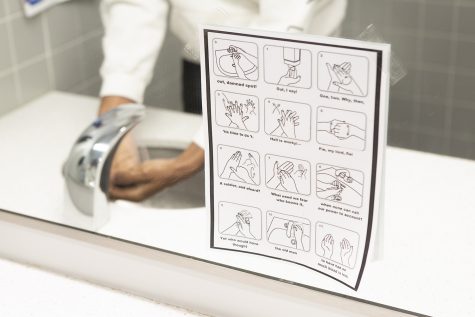Columbia joins colleges preparing for the worst in face of coronavirus outbreak
March 6, 2020

Posters emphasizing the importance of washing one’s hands to combat the coronavirus have been put up in various locations across campus.
In response to a growing concern over the global outbreak of coronavirus, also known as COVID-19, Columbia is encouraging faculty to prepare for the worst case scenario, which can include alternate means of instruction if the school decides not to hold in-person classes.
Faculty and staff who teach were advised in a March 4 email from all three deans at the college, as well as Senior Vice President and Provost Marcella David, to instruct students to stay home if they feel sick. The email recommended excusing absences that would have previously required a doctor’s note and suggested faculty permit students to avoid attending class if experiencing any symptoms of illness, such as coughing, fever or shortness of breath, until the symptoms subside.
In preparation for increased absences, the college directed faculty to plan for a disruption of college operations, encouraging the use of Canvas to deliver recorded lectures, facilitate online discussion and shift in-class activities to “online collaborations.”
“We recognize that not all course experiences can be fully replaced by online activities, but we ask for your expertise and ingenuity in reconceiving how you might deliver essential course content in a new way,” the email read.
The college also plans to release a survey to faculty and students soon for them to weigh in on Canvas accessibility and performance, according to the email.
The move comes as the University of Washington announced Friday, March 6 it would cancel all in-person classes for the next few weeks because of the coronavirus, which has left 13 people dead in the state, as of press time, according to the Associated Press.
With six confirmed cases of the coronavirus in Illinois thus far, other colleges are also preparing for campuses to be impacted.
Gloria J. Gibson, president of Northeastern Illinois University, sent a Wednesday, March 5 email to the university community referencing potential closure of the university.
“If an outbreak occurs in Chicago, we will have to consider temporary closure of the University and all of its facilities,” Gibson said in the email. “We are developing contingency plans, updating our emergency operations plans, and are looking into ways to minimize the impact a closure could have on instruction.”
Marcos Antonio Colon, a senior cinema art and science major at Columbia, said he supports the college’s approach to the epidemic.
“I definitely do feel like that’s a pretty safe countermeasure for the safety of the students,” Colon said.
At the same time, Eilish Morse-O’Rourke, a junior musical theatre performance major, said a shift to online learning could hold negative implications for students who depend on in-class activities, such as rehearsals and performances.
“It would be cutting our education short, basically. We couldn’t really do any of our usual practicing,” Morse-O’Rourke said.
Notably, in the email the college also encouraged the faculty and staff who teach to be conscious of racially-fueled discrimination toward students.
The Chronicle reported on the discrimination some Columbia students of Asian descent have faced in Chicago in a Monday, Feb. 17 article.
To combat discrimination, the college is pushing faculty to consider how they handle interactions with students.
“News reports have put a particular face on the coronavirus outbreak, and our political climate has led some to embrace isolationism and othering,” the email read.“But ours is a global campus, and this is a global virus. We ask you to think carefully about your interactions with students and colleagues, and we ask you to resist singling out individuals because of their appearance or place of origin.”
Correction 03/06/2020 at 3:21 p.m.: A previous version of this article stated the incorrect number of people who have died in Washington as a result of the coronavirus outbreak. The Chronicle regrets this error.







